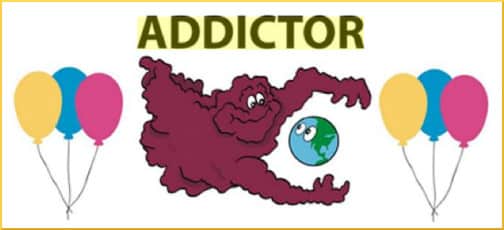People have trouble grasping the idea that all addiction is one phenomenon, expressed in various ways. Perhaps that might be because there is no recognized word for “an addictive thing” whether that thing is food or gambling, nicotine or Internet use, a substance or a behavior. For that concept, there is only the inaccurate and misleading use of “addiction.”
Logically, “addictor” should be that universally accepted word, but it isn’t. Almost the only instance of it is found in a book by Gene Smith and Lane Neihardt, which features the artwork shown on this page, with the caption, “I am habit, you’re chemical beings. I’ve GOTCHA!”
Addiction is a state or condition – and it takes a human person to be in that condition or state. An addiction is a strong interest or a need – which can only be experienced by a human. It is using something, which only a human can do. It is dependence, which only a human can experience.
“Addicted” is a state, like “allergic” is a state. A person can have an allergy, and a person can have an addiction. A person can be allergic to peanuts, but peanuts themselves are not “an allergy,” because an allergy is a condition, which only a human can experience. A person can be addicted to chocolate, but chocolate itself is not “an addiction,” because an addiction is a condition, which is experienced by a human.
The misuse of that single word has probably been responsible for a lot of the confusion in the field. So, what should the thing that causes the addiction be termed? “Addictogen” has been used occasionally, and fits the need quite well. Here are some examples of how “addictogenic” has been accepted as the adjective form:
“The propensity to produce “dependence”… is the red flag that sets apart this relatively small class of drugs, including alcohol, from the millions of other known chemical compounds. They are addictogenic… The exact molecular mechanism of addictogenesis is still the focus of scientific investigation.”
“Cocaine is a powerful stimulating agent of the central nervous system and a highly addictogenic drug.”
“America has devolved into an addictogenic culture….”
“Addictogenic” is an adjective with a clear and accepted meaning. So, why not make full use of the noun form? Something that is addictogenic is an addictogen, a much more sensible and logical word choice than what is currently, sloppily, and inaccurately applied. Either “addictogen” or “addictor” should be widely used. It is time to stop incorrectly saying “addiction” to denote what is really the addictor or addictogen.
It would not make sense to describe a test tube of pollen as an allergy. The pollen is not the allergy, but the substance that provokes an allergic reaction in people. A person can have an allergy, but an object cannot be an allergy. The gambling is not the addiction, it’s the activity that brings out an addictive reaction in people. A person can have an addiction, but an object can’t be an addiction. The wrong usage of that word only worsens an already confusing situation.
Your responses and feedback are welcome!
Source: “If Alcohol Were Invented Today,” blogspot.com, 10/30/10
Source: “Cocaine addiction,” sigmaaldrich.com, 05/01/13
Source: “Jane Unchained,” janeunchained.com, 11/28/14
Image by Gene Smith and Lane Neihardt


 FAQs and Media Requests:
FAQs and Media Requests: 











